Shareholder Spotlight: William Bingham (1752-1804)
Dana Dorman, Archivist, Library Company Papers Project
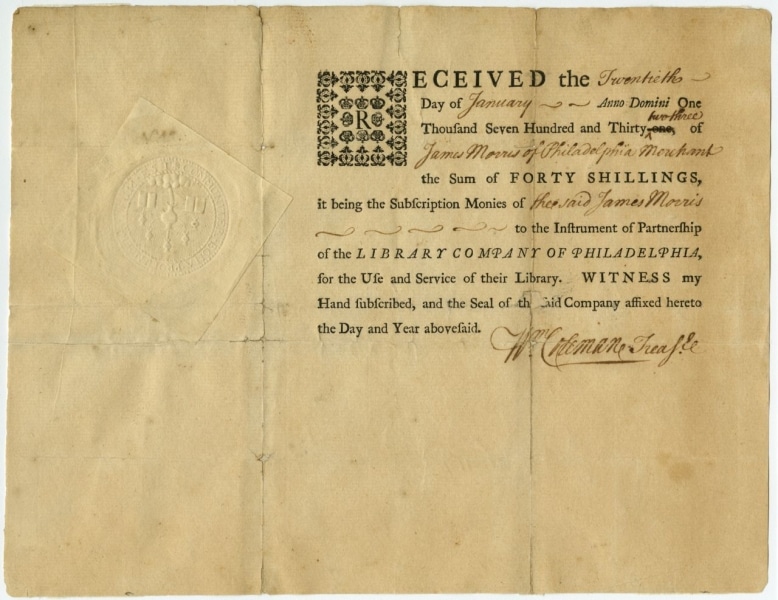
Image: Receipt for a Library Company share, 1733.
We continue our monthly “Shareholder Spotlight” series by taking a closer look at Share #566 and its first owner, William Bingham (1752-1804).
Shareholders have always been the backbone of the Library Company of Philadelphia. Starting with the first group of fifty tradesmen who formed the library in 1731, shareholders have provided crucial financial support each year for our mission to “pour forth benefits for the common good.”
We keep careful track of who has owned each historic share, and our list of 9,800+ shareholders includes signers of the Declaration and Constitution, merchants, doctors, soldiers, scientists, artists, philanthropists, politicians, and much more.
Share #566
This share was first issued to William Bingham (1752-1804) on September 3, 1789.
Bingham was a wealthy merchant and politician. He had served the British as Consul in Martinique before the Revolutionary War, but in 1775, he switched his allegiance to the colonists and became the Secretary of the Committee of Secret Correspondence of the Second Continental Congress. Over the next several years in Martinique, his success “intercepting” British cargo made him a very wealthy man.
He returned to Philadelphia in 1780, and married Anne Willing (1764-1801). The couple eventually built a large home on 3rd Street near Spruce Street.
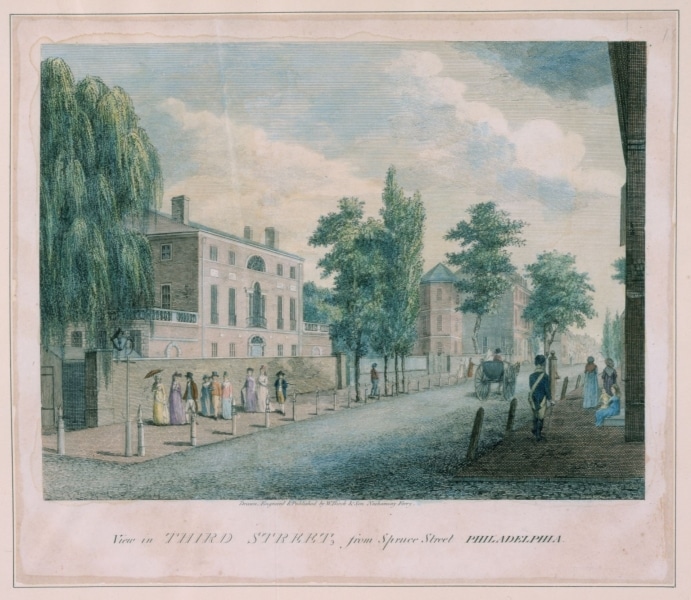
Image: William and Anne Bingham’s large home is shown on the left in this print, and what is now known as the Powell House is visible in the distance to the right. W. Birch & Son, View in Third Street, from Spruce Street Philadelphia [graphic] / Drawn, Engraved & Published by W. Birch & Son Neshaminy Ferry (Philadelphia, [1800]). Engraving mounted on paper, hand-colored.
Bingham’s wealth helped to found the first bank in the United States, which eventually became known as the Bank of North America. He also purchased extensive land holdings in Maine, Pennsylvania, and New York. (Binghamton, New York, is named in his honor.)
He became a Library Company shareholder in 1789, and two years later, he was elected to the Pennsylvania House of Representatives and served two terms there. He was also elected Speaker of the House in 1790 and 1791.
In 1792, he was elected to the board of directors for the Library Company, too. He served on a committee to “attend the labeling of the Books and placing them on the Shelves,” according to the minutes from May 10, 1792.
But he also left an even more visible legacy: that year, he gifted a larger-than-life statue of Benjamin Franklin for the Library Company’s new building near 5th and Chestnut Streets.
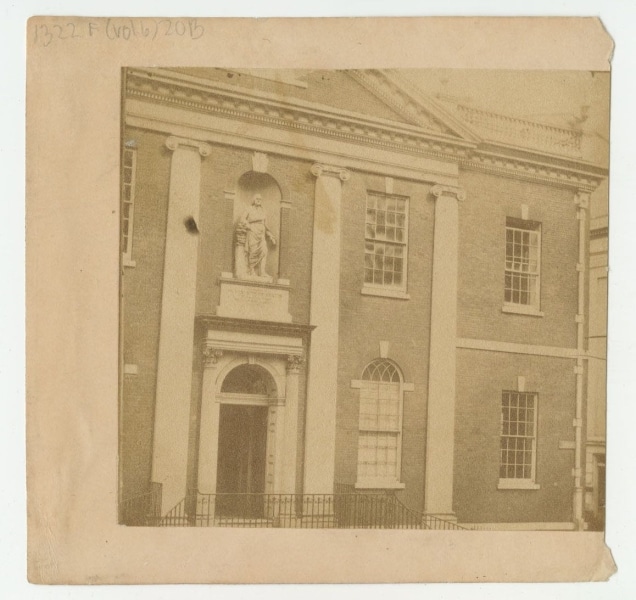
Image: [Library Company of Philadelphia, southeast corner Fifth and Chestnut streets, Philadelphia] [graphic] (Philadelphia, [circa 1860]). Half stereographic print.
Perhaps fulfilling the wishes of his fellow directors, he had commissioned an Italian artist, Francesco Lazzarini (d. 1808), to create the sculpture for a niche above the library’s front door. His letter to the directors, transcribed in the directors’ minutes of April 5, 1792, described the finished piece as “in every respect, worthy of the distinguished Personage whom it is intended to represent.”
The directors’ minutes for April 12, 1792 note that “the Statue of Dr. Franklin was placed in the Niche, in front of the Library, without any accident.” The minutes also list the agreed upon inscription for the base of the sculpture: “This statue of Dr. Benjamin Franklin was presented by William Bingham, Esqr. MDCCXCII.”
The statue would later be moved to the Library Company’s Juniper and Locust Streets building when it opened in 1880, and is still visible in a window at the front of our current building at 1314 Locust Street.
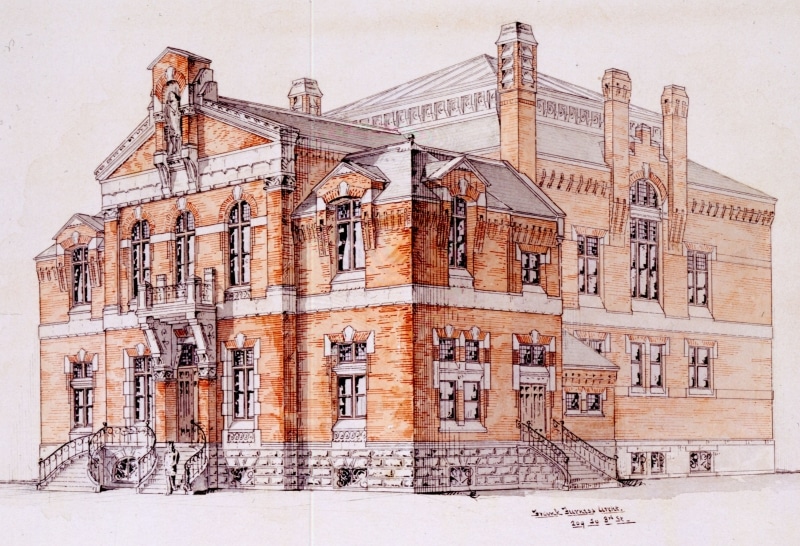
Image: The Franklin statue was eventually moved to a niche high above the front door of the Library Company’s Juniper and Locust Street building. Frank Furness, Juniper and Locust Street Building (Philadelphia, circa 1879). Ink and wash drawing.
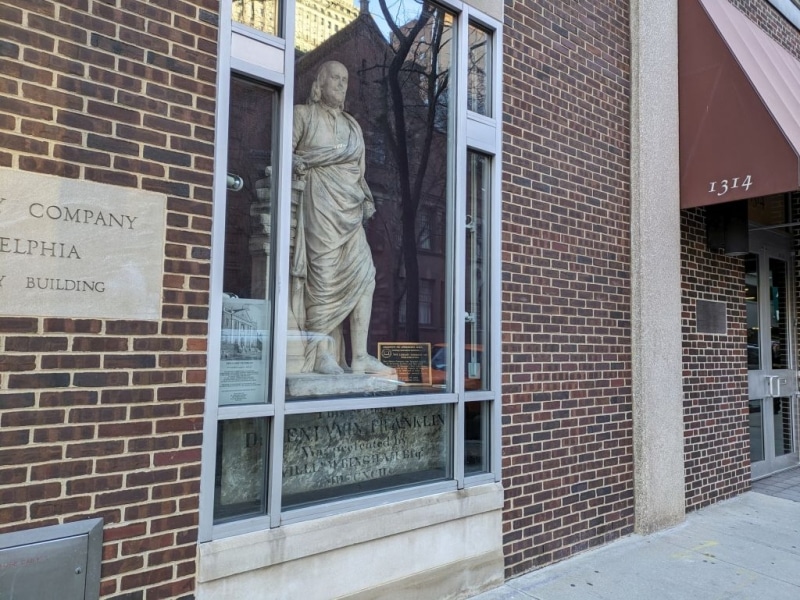
Image: Bingham’s gift is now much closer to ground-level and protected behind glass in a niche to the left of the Library Company’s front entrance. The base with the original inscription noting Bingham’s gift is also visible. Image courtesy of Dana Dorman.
In 1794, Bingham was elected to the Pennsylvania Senate, and then elected to the U.S. Senate in 1795. At the time of his death in 1804, he was still rumored to be one of the wealthiest men in the country.
The Library Company share remained associated with Bingham’s estate for more than forty years after his death. The next owner was Charles Willing, Executor, who apparently handled the transfer to Samuel H. Dickson on December 3, 1858.
Dr. Samuel Henry Dickson (1798-1872) was originally from Charleston, South Carolina, and moved to Philadelphia the same year he became a shareholder. He served as a professor at Jefferson Medical College, and published several works on medicine that are now part of the Library Company’s collections. Before he moved to Philadelphia, he had also published a pro-slavery pamphlet, “Remarks on Certain Topics Connected with the General Subject of Slavery” (Charleston: Observer Office Press, 1845).
After Dickson’s death, the share passed to his daughter, Jane A. Dickson (1829-1897), on May 2, 1878. The share has been owned by eight people total.
Not yet a shareholder?
Share #566 is currently available. We work hard to match potential shareholders with historic shares that match their interests, and we would love to match you with William Bingham’s share or another option. To learn more, reach out to our Development Office at development@librarycompany.org or 215-546-3181 ext. 142.


